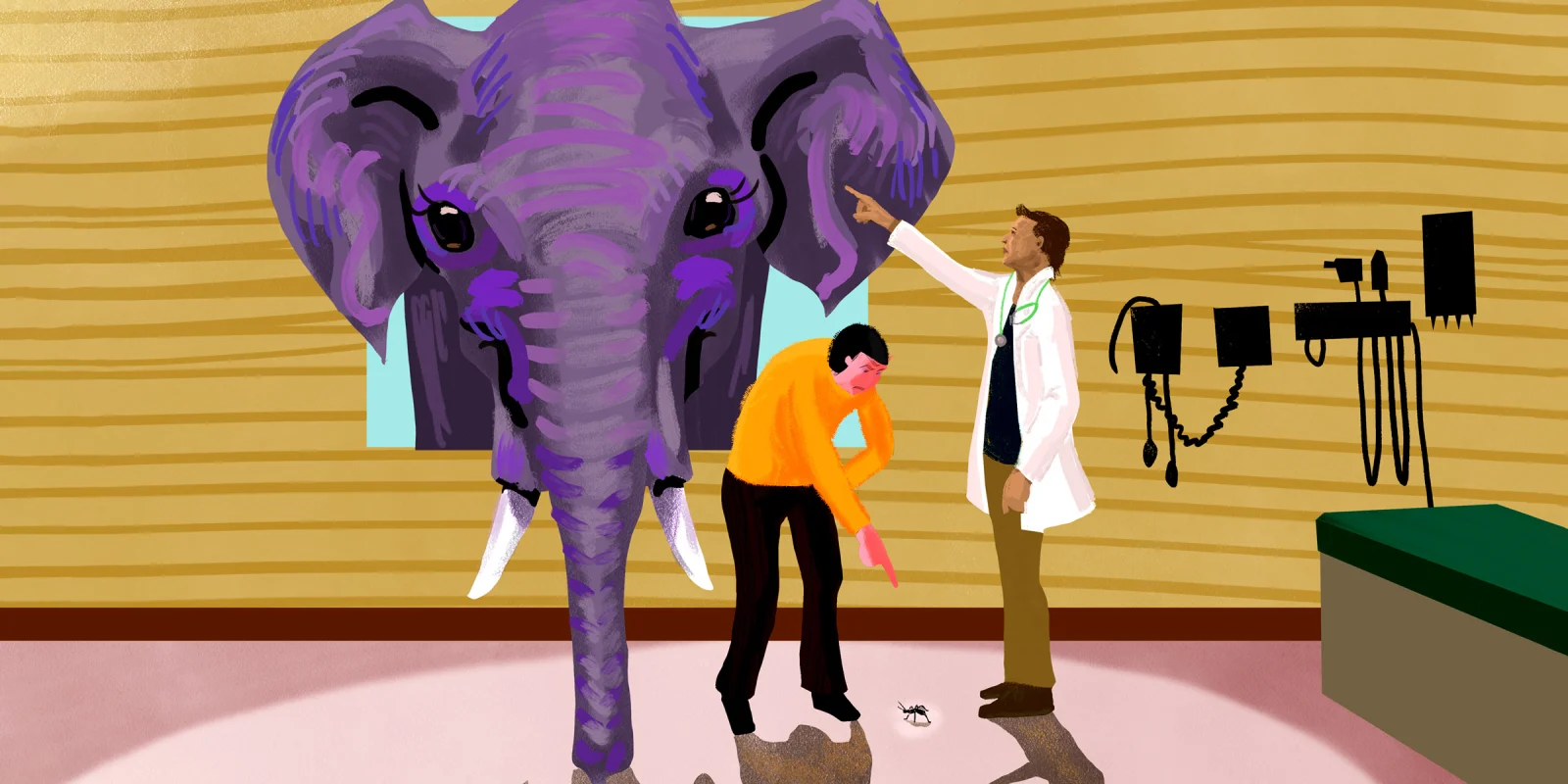I’ve been on a rotation where the same story repeats itself over and over again. I diagnose someone with a new advanced head and neck cancer originally noted as an incidental finding on imaging for COPD exacerbation or during an ER visit for dental pain. I lay it out to them: This is almost certainly cancer, and we can treat it, but you have to come to appointments and answer the phone. They promise they will but then don’t show up to preoperative testing for a biopsy, or decline calls from the clinic. I wheedle and warn, reschedule, and repeat, and inch by painful inch, get them set up to move forward with treatment. Medical oncology, radiation oncology, dental evaluation, feeding tube, tracheostomy. Check, check, check, check, and check. And then they leave against medical advice (AMA) suddenly, without tracheostomy supplies or a nutrition plan. They make it as far as the bus stop, have a respiratory event, get taken to the ED, and leave AMA again, disappearing into the wild with no indication if they’ll ever return.
I very much understand and respect every patient’s right to make decisions about their medical care and their life, even if I know it’s not the best decision medically. Patient autonomy is one of the core tenants of medical ethics. Don’t want to use fluticasone for nasal congestion? You do you. Not interested in a cochlear implant because you’re worried about how the processor would look even though you’re only a few decibels shy of being profoundly deaf? Not the decision I would make, but maybe we don’t share the same priorities. But it is incredibly difficult for me to reconcile patients willfully turning away from treating their cancer. Cancer can be very scary, and treating head and neck cancer in particular can dramatically change the way you speak, swallow, and breathe. And dying from it is truly awful.
The shock of a diagnosis of cancer takes time to process. Despite the patient’s insistence the fungating mass in their mouths suddenly appeared two weeks ago, it didn’t. It has been there for a while, and they have been ignoring it or hoping it would go away, even as evidence mounted that it wouldn’t. I don’t blame them at all. It is a very human response not to want to face what scares you or threatens you. What I can’t reconcile is patients actively turning away from the chance to save their own life. In talking about situations like this with my attendings, the lesson that seems to come with experience is that you can bring a horse to water, but you can’t make it drink. All you can do is try to do right by your patients, but ultimately, they will make their own decisions.
But as the wisely written Sherlock, portrayed by Benedict Cumberbatch, said, "Fear is a paralytic. Love is a much more vicious motivator." As probably every clinician and caregiver has learned, the people that care about a patient can be what inspires them to care for themselves. In medical school, one of my standardized patient encounters was focused on motivational interviewing. Not to brag, but I crushed it by asking the patient what she cared about the most. It wasn't herself, her health, money, or societal shame; it was her daughter. She wanted to be around to see her grow up, and that was worth quitting smoking. And oftentimes it is the sibling, spouse, parent, or friend who keeps a schedule and gets the patient to show up for appointments.
What might be harder to justify under the umbrella of medical ethics is allowing the people in your personal life to make choices you know put them at risk of real harm. This is especially true with the deeply stubborn ones, the ones who are all swagger and self-assuredness on the outside, but are so easily made nervous they immediately send you their borderline high cholesterol results for consultation. The ones who are so deeply shaken by the death of their beloved grandfather at the enviable age of 99 that, six months later, they weep in the middle of the airport upon seeing a video of their grandfather and yet can't accept that you are trying to keep them from hastening their own demise. The ones who say they're drinking less and smoking less as they finish their second beer of the conversation. How do you let someone move forward with what you know will be a mistake?
Treating patients gives you small reminders of the consequences of decisions. The view of a resident is admittedly heavily skewed toward the worst outcomes: the people in extremis in the ED, the readmissions with complications. You don't see the success stories because they don't have to come back. They're off living their lives, maybe better, maybe not, but at least alive in part because of the guidance you gave. That is a gift that shouldn't be overlooked. And in the last few weeks, as I’ve diagnosed new cancers and tried to set people on the path to treatment, I've seen a few of those success stories as well. They don't generally remember me, but I remember them. The 80-year-old Cuban grandfather who made it through chemoradiation for his base-of-tongue cancer with a truly astonishing lack of side effects, despite his advanced age and long list of comorbidities. The very, very tall gentleman who was a mess and who always got frustrated when people didn't understand him, but patently refused to use a speaking valve on his tracheostomy tube and is somehow still kicking. The sweet lady whose dogs were her "kids" and who had a supraglottic mass so big you had no idea how she even walked into the clinic, but is now almost ready to be decannulated.
In the end, I don't really have a pithy solution to this conundrum. If I had a magic answer that would help every patient make every decision in their (medically advised) best interest, I would have slapped an intellectual property designation on it and be dictating this piece to my personal assistant on my private island. There would probably be a little bit of champagne involved. But the best I can do for now is try and hope the horses are thirsty enough to take a drink.
How have you helped guide patients toward medically sound decisions? Share your experiences in the comment section.
Heather is a fourth-year otolaryngology – head & neck surgery resident at the University of Kansas Medical Center. Her clinical interests include patient communication, medical education, and facial plastic and reconstructive surgery. Heather is a 2021–2022 Doximity Op-Med Fellow.
Illustration by Jennifer Bogartz







